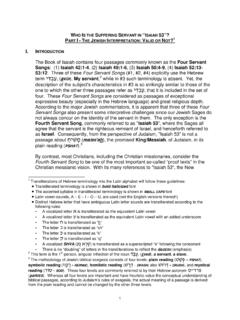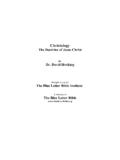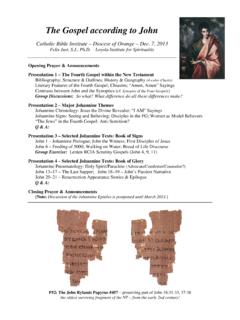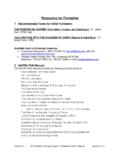Transcription of PSALMS KISS THE SON WHERE IS THAT SON OF A GUN
1 1 PSALMS 2:12 - & quot ; kiss THE SON& quot ;? WHERE IS THAT SON OF A GUN?1 I. INTRODUCTION Internet sources that list Christian & quot ;messianic prophecies& quot ;, along with the alleged accounts of their & quot ;fulfillment& quot ; in the New Testament, contain at least seven entries for PSALMS Among this set, PSALMS 2:12 is the most prominently used so-called proof text in the portfolio of Christian missionaries. Many Christian translations, the King James Version among them, employ the mistranslation kiss the Son of the Hebrew opening phrase (nashQU-VAR), the origin of which is a homiletic interpretation, not a translation, of this phrase by Rabbi Abraham Ibn Ezra, the noted Jewish exegete. A rigorous analysis of the linguistic and grammatical structure of this phrase, understanding the difference between a translation and a homiletic interpretation, and placing the psalm in its proper context, will demonstrate that kiss the Son is an incorrect translation of , which removes the basis on which the so-called proof text was fashioned.
2 When the psalm is read in the Hebrew text, or in an correct translation thereof, with proper attention to its context, the true and entirely different perspective unfolds. II. COMPARISON OF JEWISH AND CHRISTIAN ENGLISH TRANSLATIONS Side-by-side renditions of key verses in PSALMS 2 are displayed in Table II-1. The King James Version (KJV) renditions also show references to key passages in the New Testament, WHERE the respective portions of this psalm are cross-referenced. 1 Transliterations of Hebrew terminology into the Latin alphabet will follow these guidelines: Transliterated terminology is shown in bold italicized font The accented syllable in transliterated terminology is shown in SMALL CAPS font Latin vowel-sounds, A E I O U, are used (not the English versions thereof!)
3 Distinct Hebrew letter that have ambiguous Latin letter sounds are transliterated according to the following rules: - A vocalized letter is transliterated as the equivalent Latin vowel - A vocalized letter is transliterated as the equivalent Latin vowel with an added underscore - The letter is transliterated as h - The letter is transliterated as ch - The letter is transliterated as k - The letter is transliterated as q - A vocalized SHVA ( ) is transliterated as a superscripted e following the consonant - There is no doubling of letters in the transliterations to reflect the daGESH (emphasis) 2 Two examples of such lists are: (1) 365 Messianic prophecies that Yeshua fulfilled - , and (2) Messianic Prophecies Fulfilled by Jesus Christ - 2 [The references are found in the New American Standard Bible (NASB), but the corresponding passages, quoted below the table, are quoted from the KJV.]
4 ] Table II-1 PSALMS 2:1-2, 6-8, 11-12 (Shown are only verses mentioned in the analysis) vs. King James Version Translation Jewish Translation from the HebrewHebrew Text PSALMS 2 1 Why do the heathen rage, and the people imagine a vain thing?(i) Why are nations in uproar; and [why are] kingdoms saying vain things? 2 The kings of the earth set themselves, and the rulers take counsel together, against the LORD, and against his anointed, saying,(ii) Kings of a land stand up, and nobles take counsel together against the Lord, and against His anointed [saying]: 6 Yet have I set my king upon my holy hill of Zion. & quot ;But I have enthroned My king upon Zion, My holy mountain.
5 & quot ; 7 I will declare the decree: the LORD hath said unto me, Thou art my Son; this day have I begotten thee.(iii) I will tell of the decree; The Lord said to me, & quot ;You are My son; this day have I begotten you.& quot ; 8 Ask of me, and I shall give thee the heathen for thine inheritance, and the uttermost parts of the earth for thy possession.(iv) & quot ;Ask of Me, and I shall make nations your inheritance; and the ends of the earth [I shall make] your possession.& quot ; 11 Serve the LORD with fear, and rejoice with trembling. Serve the Lord with fear, and rejoice with trembling. 12 kiss the Son, lest he be angry, and ye perish from the way, when his wrath is kindled but a little.
6 Blessed are all they that put their trust in him. Do homage in purity, lest He become scornful and you perish in the way, for in a flash His anger will kindle; happy are all who take refuge in Him. (i) Acts 4:25(KJV) Who by the mouth of thy servant David hast said, Why did the heathen rage, and the people imagine vain things? (ii) Acts 4:26(KJV) The kings of the earth stood up, and the rulers were gathered together against the Lord, and against his Christ. (iii) Acts 13:33(KJV) - God hath fulfilled the same unto us their children, in that he hath raised up Jesus again; as it is also written in the second psalm, Thou art my Son, this day have I begotten thee.
7 Hebrews 1:5(KJV) - For unto which of the angels said he at any time, Thou art my Son, this day have I begotten thee? And again, I will be to him a Father, and he shall be to me a Son? Hebrews 5:5(KJV) - So also Christ glorified not himself to be made an high priest; but he that said unto him, Thou art my Son, to day have I begotten thee. (iv) Revelation 2:26(KJV) And he that overcometh, and keepeth my works unto the end, to him will I give power over the nations: Excepting two revisions from the Hebrew, one obvious and the other subtle, the two translations are reasonably consistent. The obvious revision occurs at PSALMS 2:12, WHERE the two translations disagree on the opening phrase, and WHERE the Christian rendition imputes a heavy dose of Christology into the context of King David's words.
8 The subtle change occurs at PSALMS 2:7, WHERE the KJV translators have replaced 3 the term & quot ;son& quot ; with & quot ;Son& quot ;, an action that enhances the Christological appeal of this psalm (& quot ;Son& quot ; is also used as part of the revision in PSALMS 2:12). In addition, tenses of some verbs were changed, but these do not have a serious impact on the context. III. OVERVIEW OF CHRISTIAN AND JEWISH INTERPRETATIONS A. The Christian Perspective The Christian view of this psalm is based on the claim that David and his kingdom are & quot ;types& quot ; that foreshadow Jesus and his kingdom, and that the prophecies related to the & quot ;first coming& quot ; of Jesus refer to David as his ancestor. In most Christian Bibles the opening phrase of PSALMS 2:12, kiss the Son , creates a link to the declaration in PSALMS 2:6-8 regarding who this & quot ;Son& quot ; is.
9 Verses 1, 2, 7, 8 are cross-referenced with passages in the New Testament as shown under Table II-1. These passages in the New Testament identify Jesus as the subject in the corresponding verses being & quot ;quoted& quot ; from PSALMS 2. Curiously, the New Testament is silent on the opening phrase of PSALMS 2:12. This may very well be due to the fact that, in the form it was known to the authors of the New Testament, they did not consider this part of PSALMS 2:12 to have any Christological value. Yet, excepting the ancient translations, most Christian translations render the opening phrase of PSALMS 2:12 as kiss the Son, an overt attempt to link Jesus into this verse as well. Standard Christian sources, such as the commentaries by Matthew Henry (MH) and Jamieson, Fausset, & Brown (JF&B), provide more detailed verse-by-verse Christian interpretations of PSALMS 2 that are beyond the scope of this B.
10 The Jewish Perspective King David, the author of PSALMS 2, is saying here that, no matter how powerful the force, nothing can thwart God's will. The Jewish Sages, both ancient and modern, are split on whether the subject of this psalm is (maSHI'ah), the Messiah, or a former king and, if a former king, they disagree on the identity of this king. The noted Jewish Sage RaSHI (Rabbi Shlomoh Ben Yitzhak [1040-1105 CE]) offers the following commentary at the beginning of the psalm: & quot ;Our Rabbis expound it as relating to king Messiah; but according to its plain meaning it is proper to interpret it in connection with David, in the light of the statement: 'And when the Philistines heard that David was anointed king over Israel, all the Philistines went up to seek David; and David heard of it, and went down to the fortress.









